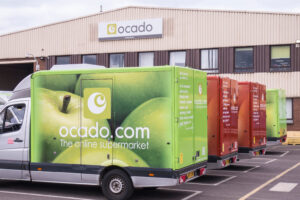Ocado has said it expects to spend up to £5m hiring and paying delivery drivers amid a nationwide Brexit-related shortage, as it announced a £10m loss related to a warehouse fire in July.
The online grocer joined other supermarkets in urging the government to add lorry drivers to its list of occupations eligible for skilled worker visas.
Ocado said it faces a bill of up to £5m this year because of the rising cost of large goods vehicle and delivery drivers as well as warehouse staff.
A surge in online shopping during the pandemic coupled with a driver shortage caused by Brexit and the Covid crisis has forced Ocado, and other supermarket groups, to raise hourly rates and offer signing-on bonuses.
The Ocado chief financial officer, Niall McBride, said on Tuesday that he agreed with the Morrisons chief executive, David Potts, when he suggested last week that heavy goods vehicle drivers should be eligible for skilled worker visas.
Tim Steiner, the Ocado chair, added: “Making it easier is the right answer … it’s important to be able to get more people through the process.” He said increasing the number of people running tests for aspiring drivers would also help.
He said the company was not just concerned about driver shortages. “It’s the broader labour shortages in the whole country that we are working to mitigate the impact of,” he added. He declined to say how much Ocado was paying in bonuses.
The online grocer also revealed that the July blaze at its warehouse in Erith, caused by the collision of three robots resulted in 300,000 orders being lost.
Ocado said the business disruption cost it £10m, plus another £10m for stock and other write-offs. The resulting net cost, not covered by insurance, was estimated to be £10m, which will drag down profits for the current year.
Ocado revenues were down 1.8% in the first six weeks of its latest quarter, the 13 weeks to 29 August, which worsened to a 19% slump in the remaining seven weeks of the quarter because of the fire. Overall, revenues fell 10.6% to £517.5m in the quarter, while average orders a week increased by 1.4% to 338,000.
The government previously considered adding HGV drivers to its list of skilled workers to fill the gaps, but the idea was scrapped. Ministers said they would instead change licensing rules to make it easier to qualify and to increase the amount of hours drivers could work.
Ocado said it had increased warehouse capacity at Purfleet in Essex and Andover in Hampshire, with the latter processing 20,000 orders a week. This helped offset additional safety measures at Erith, which Ocado expects to return to pre-fire capacity by the end of November, in time for Christmas.
Steiner is confident of a “bumper Christmas” with Ocado delivery slots usually selling out months in advance. He downplayed the issue of food shortages, saying: “We see small interruptions but nothing substantial.” McBride said Ocado had a wider product range than some rivals that it could “flex up or down”.
Last week the Food and Drink Federation’s Ian Wright warned food shortages could become permanent in Britain as the just-in-time delivery system was no longer working, although the country would not run out of food.
Ocado is building vast warehouses and has replaced human pickers with robots that crisscross a giant chessboard-style grid layout to sort its orders. Steiner said its latest robots, introduced at the start of the year, could not cause a fire as their “lithium ion cells are so well protected” inside them, while the old model robots were getting a service patch to prevent future blazes. He stressed that Ocado was only selling its new robots to other companies.
Ocado said it had attracted a record number of new customers, up 64,000 to 805,000 in the last quarter.
Read more:
Ocado to spend extra £5m on drivers amid Brexit-related shortage
















